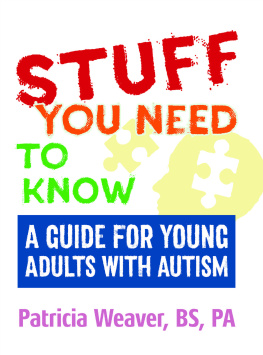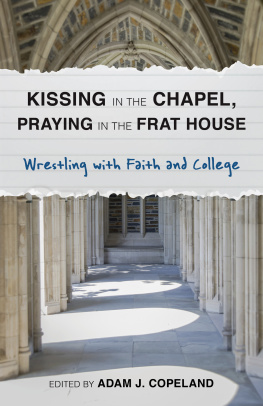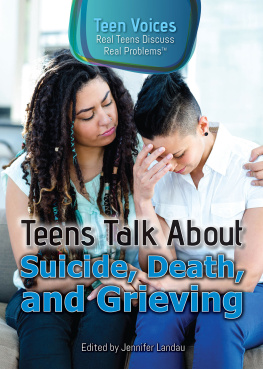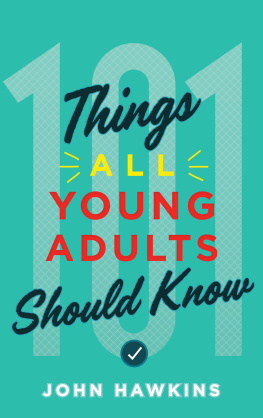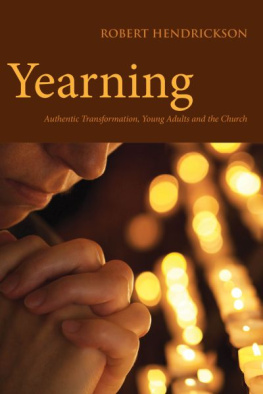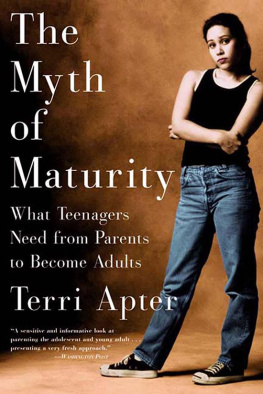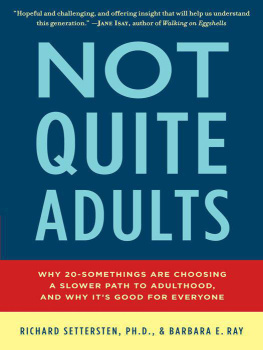
As a grieving student, your life feels like a hurricanea whirlwind of emotions that often you cant put a name to, of frustration with your situation, and pain. This book sorts through everything Ive felt, helping me feel understood. Rather than trying to show me how to stop grieving or stop experiencing these emotions, this book helps me through the grief journey, reminding me that it is important to feel for and love the person you lost in order to find healing.
Melanie Wolff, University of Pennsylvania student, Class of 2016
I see We Get It as a much-needed tool for those who work with college students on a daily basis. College student personnel such as clinicians, residential life staff, Dean of Student staff, and faculty and administrators could truly benefit from reading about the themes notedand even more powerfully from the students stories. The range of student experience covered through the first-person and beautifully honest narratives allows for a deeper level of understanding and perspective-taking, providing a unique insight into how best to support grieving students.
Philip M. Meilman, PhD, Director, Counseling and Psychiatric Service, and Professor, Department of Psychiatry, Georgetown University
Whether youre a counselor, parent, or grieving college student, the 33 stories shared here will provide insight into some of the commonalities and differences young adults experience after the death of a parent or sibling, as well as tips on how to be helpful. Their journeys of struggle and healing offer wisdom and hope.
Donna L. Schuurman, EdD, FT, Chief Executive Officer, The Dougy Center for Grieving Children and Families
This book is important. It brings to life in clear, plain English stories of young adults who have coped with the death(s) of persons they love. Heather and David get it. They understand what coping with loss entails for a college student. They make the myriad experiences of young adults dealing with bereavement come alive for all of us. The stories told by grieving young adults illustrate clearly several important themes that scholars have uncovered about bereavement. Heather and Davids mastery of what they know will help others to get what the bereaved college student knows.
David E. Balk, Professor and Chair, Department of Health and Nutrition Sciences, Brooklyn College of the City University of New York, and author, Helping the Bereaved College Student
of related interest
Still Here with Me
Teenagers and Children on Losing a Parent
Edited by Suzanne Sjqvist
ISBN 978 1 84310 501 5
eISBN 978 1 84642 580 6
Effective Grief and Bereavement Support
The Role of Family, Friends, Colleagues, Schools and Support Professionals
Atle Dyregrov and Kari Dyregrov
ISBN 978 1 84310 667 8
eISBN 978 1 84642 833 3
Talking with Bereaved People
An Approach for Structured and Sensitive Communication
Dodie Graves
ISBN 978 1 84310 988 4
eISBN 978 0 85700 162 7
Setting Up and Facilitating Bereavement Support Groups
A Practical Guide
Dodie Graves
ISBN 978 1 84905 271 9
eISBN 978 0 85700 573 1
Writing in Bereavement
A Creative Handbook
Jane Moss
ISBN 978 1 84905 212 2
eISBN 978 0 85700 450 5
WE
GET
IT
Voices of Grieving College Students and Young Adults
HEATHER L. SERVATY-SEIB AND DAVID C. FAJGENBAUM
With contributions by 33 inspirational young adults

Jessica Kingsley Publishers
London and Philadelphia
First published in 2015
by Jessica Kingsley Publishers
73 Collier Street
London N1 9BE, UK
and
400 Market Street, Suite 400
Philadelphia, PA 19106, USA
www.jkp.com
Copyright Heather Servaty-Seib and David Fajgenbaum 2015
All rights reserved. No part of this publication may be reproduced in any material form (including photocopying or storing it in any medium by electronic means and whether or not transiently or incidentally to some other use of this publication) without the written permission of the copyright owner except in accordance with the provisions of the Copyright, Designs and Patents Act 1988 or under the terms of a licence issued by the Copyright Licensing Agency Ltd, Saffron House, 610 Kirby Street, London EC1N 8TS. Applications for the copyright owners written permission to reproduce any part of this publication should be addressed to the publisher.
Warning: The doing of an unauthorised act in relation to a copyright work may result in both a civil claim for damages and criminal prosecution.
Library of Congress Cataloging in Publication Data
Servaty-Seib, Heather L. (Heather Lynn)
We get it : voices of grieving college students and young adults / Heather L. Servaty-Seib and David C.
Fajgenbaum ; with contributions by 33 inspirational young adults.
pages cm
Includes bibliographical references.
ISBN 978-1-84905-752-3 (alk. paper)
1. Grief. 2. Death. 3. Young adults--Psychology. 4. College students--Psychology. I. Fajgenbaum, David
C. II. Title.
BF575.G7S44 2015
155.9370842--dc23
2014048996
British Library Cataloguing in Publication Data
A CIP catalogue record for this book is available from the British Library
ISBN 978 1 84905 752 3
eISBN 978 0 85700 977 7
This book is purchased in memory of
____________________________
This book is dedicated to:
Anne Marie Fajgenbaum, for her beautiful life that inspired the creation of a nonprofit to help grieving college students.
Linda Ann Moline, for her passion, presence, and courage to live her own wayeven at the end of her life.
Davids family and friends, including Caitlin Fajgenbaum, Gena Combs, Lisa Fajgenbaum, David M. Fajgenbaum, Ben Chesson, Kiri Thompson, and David Balk.
Heathers family, including Broc, Klara, and Mia Seib.
Contents
Introduction
I feel like Im the only person on a campus of 20,000 students who is dealing with grief, and I feel completely alone. How come no one gets it? I need support from someone who gets what Im going through.
This is a question that both of us are frequently asked by students and a question that we asked when we were in college too. Losing a loved one is difficult at any age, but there are certain things about young adulthood that can make it a particularly difficult time, including developmental (e.g., identity development, separation/connection with family) and setting-based (e.g., geographic distance, college as fun) challenges. These unique issues often leave college students and young adults feeling unable to discuss their grief experiences and can lead to a growing sense of isolation, of being different, and pressure to pretend that everything is OK. Grieving college students can begin to believe they are the only ones in their social circles or even campuses who have experienced the illness and/or death of someone close to them and that there is no one around them who gets what they are going through.
These are several of the reasons that we, Heather and David, have both dedicated much of our lives to helping grieving college students and young adults. Heather has published bereavement research, advocated for young adult grievers as the President of the Association for Death Education and Counseling, and helped to establish one of the only student bereavement leave policies in the United States on her campus at Purdue University. She has also counseled many students (and parents of students) seeking support, and guided many colleagues wishing to help their grieving students. David established a peer-led grief support group at Georgetown University after his mother died, grew the organization into a national movement that has reached more than 3000 grieving students on more than 200 campuses, and helped to make college student grief a priority issue in higher education in the United States (U.S.).
Next page


